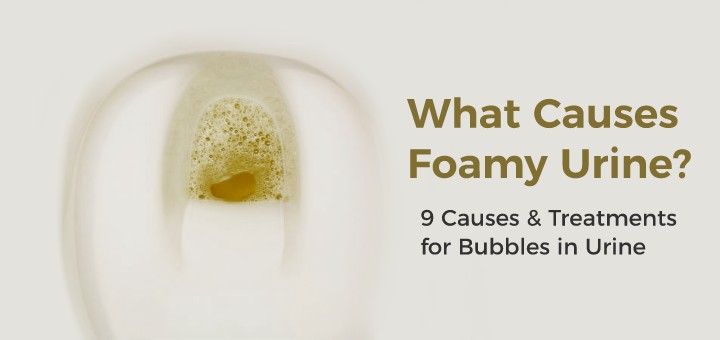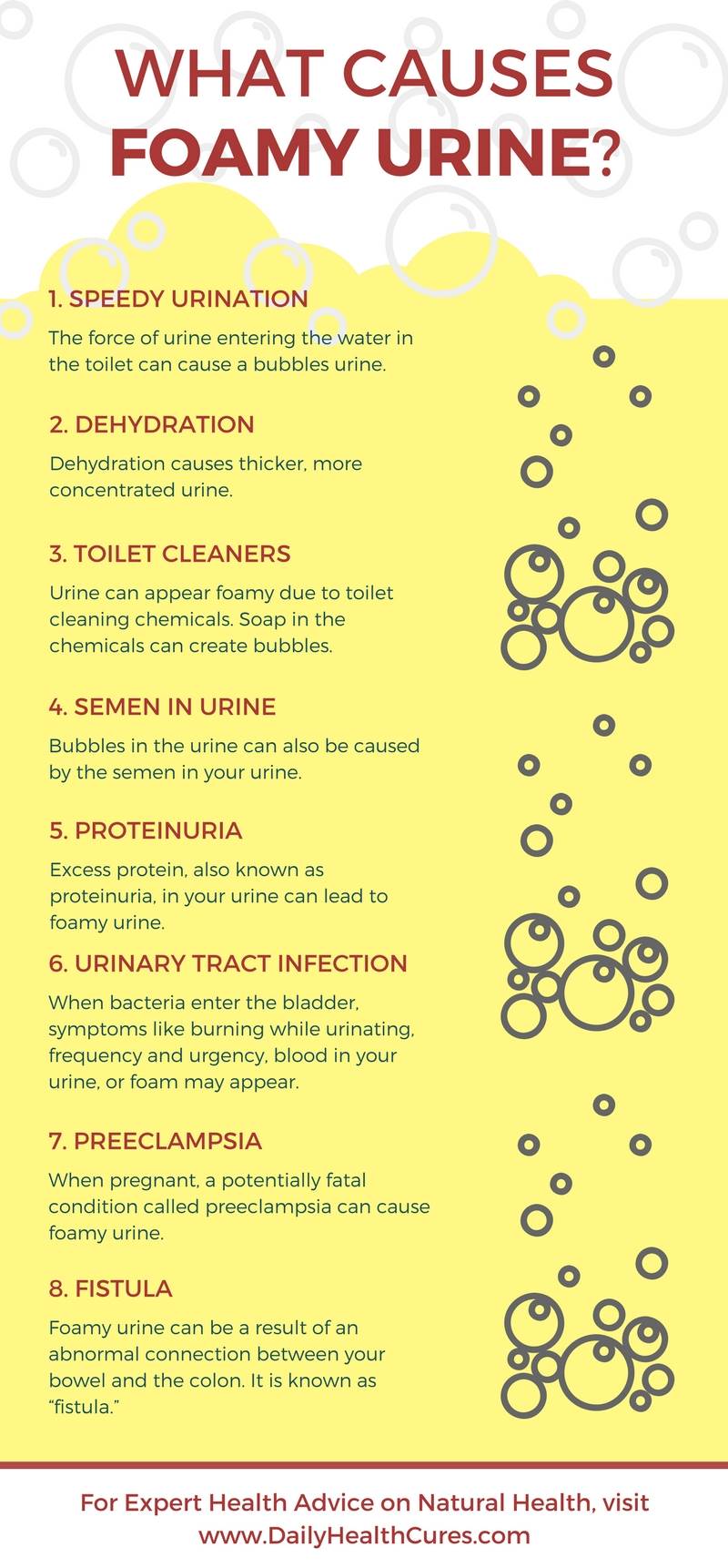What Causes Foamy Urine and How Is It Treated

Most people don’t pay attention to their urine in the toilet, but if you notice foam in the urine, don’t panic. Foam or bubbles in the urine can be normal or abnormal.
Urination is a way of removing waste and unused products from the body. Urine is typically light to dark yellow in color. Its color and consistency depend on a variety of factors. Some of them include diet, medicines, hydration, or an underlying illness.
Foamy urine in the morning may be normal, or it may be a sign of a serious health issue. The speed of urination can also make the urine appear foamy.
In this article, we’ll see the common symptoms, causes, and treatments for the foamy urine.
Also Read: Left Testicle Pain: Causes and Treatments
Symptoms That Can Occur with Foamy Urine
If foamy bubbles in the urine are due to disease or illness, you may experience other symptoms which signal that a more severe problem.
The symptoms that you can check for include:
- Swelling of hands, feet, face, or belly due to fluid buildup from kidneys
- Feeling sluggish or tired
- Not feeling hungry or loss of appetite
- Feeling nauseous
- Vomiting
- Insomnia or difficulty sleeping
- Cloudy or dark colored urine
- Back pain
- Weakness
- Foul smelling urine
Sometimes there might be blood and pus in your urine which may be the result of a urinary tract infection (UTI).
Consult your doctor immediately when you experience any of these other symptoms along with bubbles in the urine.
9 Possible Causes of Foamy Urine
There are some normal and abnormal causes for foamy bubbles in your urine. Let’s see them in detail.
Normal causes include:
1. Force or Speedy Urination
The force of urine entering the water in the toilet can cause a bubbles urine.
The strong force creates bubbles as the urine enters the water. In fact, some people delay urinating, overfilling the bladder which leads to a speedy urination.
2. Dehydration
Dehydration causes thicker, more concentrated urine. It can also cause foam in urine. Drinking plenty of water can help you avoid this problem.
3. Toilet Cleaners
Urine can appear foamy due to toilet cleaning chemicals.
Soap in the chemicals can create bubbles. To make sure that the cleaner is the cause, urinate in a clean container. If no foam appears, you can know that the toilet cleaner is causing the foam.

4. Semen in Urine
Bubbles in the urine can also be caused by the semen in your urine.
Sperms can sometimes be left in the urethra after ejaculation. Also, men who experience reverse ejaculation may also notice foamy bubbles in the urine.
Abnormal causes include:
5. Proteinuria
Excess protein, also known as proteinuria, in your urine can lead to foamy urine (1). In this condition, the kidneys do not function as they should and release protein into the urine.
Although protein is released into the urine from the kidneys naturally, excess protein in the urine is not normal. It could be a sign of chronic or acute kidney disease.
High blood pressure or diabetes can hamper the kidneys filtering ability and cause the excess protein to get excreted.
6. UTI (Urinary Tract Infection)
A urinary tract infection can cause foamy urine (2). When bacteria enter the bladder, symptoms like burning while urinating, frequency and urgency, blood in your urine, or foam may appear.
In fact, even the antibiotic you take to treat the infections can also cause foam in urine.
7. Preeclampsia
When pregnant, a potentially fatal condition called preeclampsia can cause foamy urine (3). It leads to swelling of legs, headaches, high blood pressure, and proteinuria.
Preeclampsia commonly occurs after 20 weeks of pregnancy and a blood pressure above 140/90. Without medical attention, this condition is fatal to both, mother and baby.
8. Fistula
Foamy urine can be a result of an abnormal connection between your bowel and the colon. It is known as “fistula.” (4)
The causes of fistula can be tumors, surgical complications, or inflammatory conditions such as Crohn’s disease.
This abnormal connection causes air, gas, and bacteria to enter your bladder and mix with your urine.
9. Kidney Diseases
Kidney problems like diabetes, high blood pressure, kidney stones, frequent kidney infections, and drug abuse can also cause foam in urine.
Some symptoms of kidney problems include:
- Swelling of legs
- A backache
- Weakness
- Nausea and fatigue
How to Treat Foamy Urine?
Foamy urine can be treated in a variety of ways depending on the cause.
Sometimes simply drinking more water can help prevent a foam in the urine. If it due to antibiotics or certain other drugs, you can stop taking them and consult with your doctor.
You should also empty the bladder regularly to avoid forceful and speedy urination.
However, for the abnormal causes of foamy urine, a different approach is necessary.
If the bubbles are due to proteinuria, you will need to avoid protein supplements and high-protein foods.
Preeclampsia can be treated with medication as well, but it must be dealt with soon after you experience the symptoms.
Antibiotics and increasing the fluid intake can help you treat the urinary tract infections. Drinking enough water and fresh juices help flush out the microorganisms.
If the bubbles in urine are due to fistula or kidney diseases, you should consult a doctor.
When Should You See a Doctor?
You should consult a doctor if:
- The foamy urine doesn’t fade in a few days
- You experience other symptoms such as swelling, upset stomach, vomiting, loss of appetite, and you feel sluggish or tired
- Your urine is cloudy or bloody
- You are male and produce small amounts or no fluid during orgasm. If even after trying for more than a year you have had no success in getting your partner pregnant
- You are pregnant and experience foamy urine, severe headaches, blurred vision, abdominal pain, and high blood pressure (over 140/90)
Blood tests to measure kidney function, electrolyte levels, and a urinalysis will help determine the underlying causes of foam in the urine.
Like and Subscribe
Sharing is caring! Your love and support motivates us!
